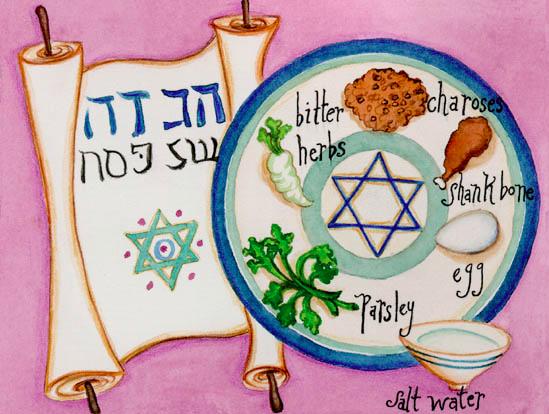A Question of Freedom
The secular New Year signals a significant Jewish calendar moment for me. January is the time to start reminding the children to make travel plans to come home for Passover seder. The seders are on weekend nights this April, so there should be no excuses about missing work or school. Once the anxiety about travel plans is addressed, the more demanding questions children pose about Passover and Judaism will soon arise.
This week we read in Parshat Bo about the obligation of the Passover offering. The festive meal is a ritual to mark how the angel of death passed over the homes of the Israelites. After the people enter the Promised Land, they will observe a seven day Passover holiday.

With great insight, the Torah then predicts the way the children will approach this ritual. In Exodus 12:26, we read: “It will be that your children will ask of you what do you mean by this service?”
The Torah already predicts the tension to come. The children may be skeptical and many parents will be anxious about passing along our traditions to the dubious members of the next generation.
If we expand upon the rituals, we can better connect with the greater meaning of the holiday and better engage the next generation. An ever evolving passover seder is proof of attempts to innovate and those innovations may be part of the reason that the seder is the most widely observed of Jewish rituals.
Today it seems like every seder has to have a requisite amount of creativity to be engaging – from parodying the musical show Hamilton to Jeopardy-style quiz shows. The underlying goal remains to help all of us appreciate the essential themes of Passover using whatever methods will resonate best.
The seder format has also been refashioned to address political themes. For example, this year marks the fiftieth anniversary of the first Freedom Seder. Originally held on the one-year anniversary of the death of Martin Luther King, Jr., hundreds of Jews and Christians gathered together at a Washington, D.C. church to send a message of cooperation and liberation. Later groups created women’s seders, labor seders and social justice seders. The over arching message of these alternative seders is that freedom is not merely for one group and it cannot be assumed to be permanent for any group. And once one group of people have their freedom they have the obligation to liberate others.

The next generation is perhaps a bit savvier than its elders. Younger people today are asking questions about more than the purpose of a seder. They want to know the effective meaning of Judaism as expressed through it’s rituals and prayers. Without meaning rituals and prayers are mere activities and words. But their impact upon each of us should be to serve as reminders to advocate freedom, spread kindness, and pursue peace. It is incumbent upon us to recast Jewish traditional practices to highlight the ways in which our religion can improve the world – bringing hope to all.
Marking calendars and booking tickets are only a start on the Jewish journey. Every generation can adapt Jewish traditions to connect with the interests and sensibilities of future generations. Torah predicted that our children would be asking as much of us. Now is the time for those of us with the interest, the resources and the skills to figure out the ways to make relevant the Judaism of the future. The Passover seder is just one place to start.
Rabbi Evan J. Krame






 Evan J. Krame was ordained as a rabbi by the
Evan J. Krame was ordained as a rabbi by the